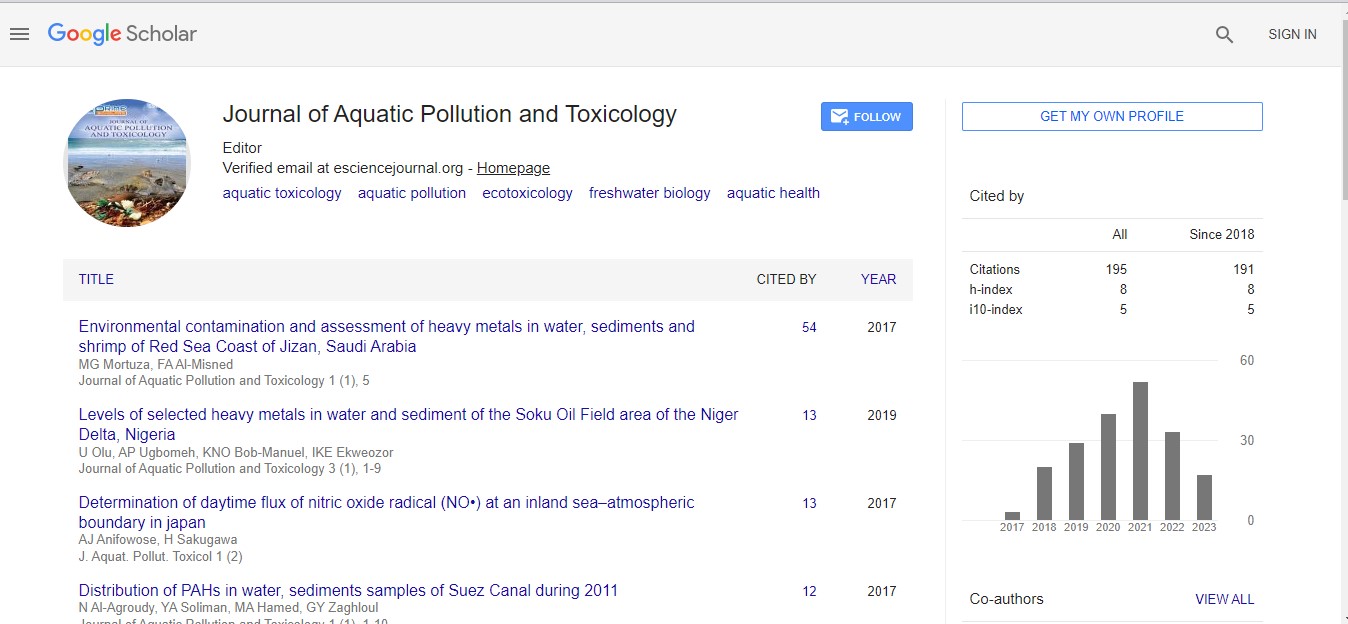Short Communication - (2023) Volume 7, Issue 2
The Lasting Legacy of Oil Spills: A Comprehensive Analysis of Environmental Damage
Timothy Saber*
Department of Environmental Sciences, University of Toronto, Canada
*Correspondence:
Timothy Saber,
Department of Environmental Sciences, University of Toronto,
Canada,
Email:
Received: 29-May-2023, Manuscript No. IPJAPT-23-17230;
Editor assigned: 31-May-2023, Pre QC No. IPJAPT-23-17230 (PQ);
Reviewed: 14-Jun-2023, QC No. IPJAPT-23-17230;
Revised: 19-Jun-2023, Manuscript No. IPJAPT-23-17230 (R);
Published:
26-Jun-2023, DOI: 10.21767/2581-804X-7.2.11
Introduction
Oil spills have become a substantial environmental concern,
causing grave repercussions for marine ecosystems and the human
population in affected regions. This essay seeks to explore
the adverse environmental effects of oil spills, analyzing both
the immediate consequences and the long-term impact on
aquatic life, coastal areas, and the economy. Aquatic Life: The
immediate aftermath of an oil spill in aquatic environments is
catastrophic for marine organisms. Birds, mammals, and fish
can find themselves coated in oil, which disrupts their ability to
move or feed. The oil can also clog the gills of fish, leading to
suffocation. Coastal Ecosystems: Coastal areas are particularly
vulnerable to oil spills as they house complex ecosystems like
mangroves, coral reefs, and tidal marshes [1,2].
Description
Oil spills can smother these delicate habitats, resulting in immediate
and possibly irreversible damage. Water Quality: The
oil spill leads to a dramatic decline in water quality. It creates
a thick layer on the water surface, reducing oxygen levels,
which can be lethal for aquatic life. The presence of toxic substances
within the oil can also contaminate the water, posing
health risks to organisms relying on that water source. Chronic
Effects on Marine Species: Even after the immediate threat is
managed, oil spills continue to pose a chronic risk to marine
life. Some species may suffer from long-lasting reproductive,
developmental, and behavioral issues. The contamination in
their habitat may lead to a decrease in population numbers
and an imbalance in the ecosystem. Economic Impact: Fishing
and tourism industries are often severely affected by oil
spills. Fishing grounds can become contaminated, leading to a
decline in fish stocks. The tourism industry also suffers when
beautiful coastal areas are marred by oil slicks. Impact on Human
Health: Communities that rely on affected water bodies
for their livelihood or sustenance may face health risks. Consuming
contaminated seafood or using polluted water can lead
to various health problems. Cleanup Challenges: Cleaning up
an oil spill is a complex, expensive, and time-consuming process.
The methods used to clean up oil can sometimes cause
additional environmental harm. For instance, using dispersants
to break down oil can create toxins that further damage marine
life. Psychological Impact: The long-term psychological impact
on the communities affected should not be underestimated.
The loss of livelihood, decline in the health of loved ones, or
destruction of a cherished natural environment can have lasting
emotional effects. The best way to deal with oil spills is
through prevention, which requires strong regulations, regular
inspections, and strict enforcement [3,4].
Conclusion
Technological advancements in oil extraction, transport, and
containment can also reduce the risk of spills. When spills do
occur, a quick and well-coordinated response is vital. Investing
in research to develop more effective and environmentally
friendly cleanup methods is essential. Oil spills pose a grave
and multifaceted threat to the environment, impacting both
the natural world and human society. They result in immediate
devastation to marine and coastal ecosystems and have
lingering effects that can persist for decades. While technological
advancements and stringent regulations can minimize the
risk, continued vigilance and investment in research are crucial
to protecting our environment and our communities from the
damaging consequences of oil spills. The environmental impact
of oil spills reminds us of the intricate connection between human
activities and the natural world, emphasizing the need for
responsible stewardship of our planet.
Acknowledgement
None.
Conflict Of Interest
The author declares there is no conflict of interest in publishing
this article.
References
- Adedara IA, Ebokaiwe AP, Mathur PP, Farombi EO (2014) Nigerian bonny light crude oil induces endocrine disruption in male rats. Drug and Chemical Toxicology, 37(2): 198-203.
[Crossref] [Google Scholar]
- Afshar-Mohajer N, Fox MA, Koehler K (2019) The human health risk estimation of inhaled oil spill emissions with and without adding dispersant. Science of the Total Environment 654: 924-932.
[Crossref] [Google Scholar]
- Camilli R, Bowen A, Reddy CM, Seewald JS, Yoerger DR (2012) When scientific research and legal practice collide. Science, 337(6102): 1608-1609.
[Crossref] [Google Scholar]
- Beyer J, Trannum HC, Bakke T, Hodson PV, Collier TK (2016) Environmental effects of the Deepwater Horizon oil spill: A review. Marine Pollution Bulletin, 110(1): 28-51.
[Crossref] [Google Scholar]
Citation: Saber T (2023) The Lasting Legacy of Oil Spills: A Comprehensive Analysis of Environmental Damage. J Aquat Pollut Toxicol. 7:11.
Copyright: © 2023 Saber T. This is an open-access article distributed under the terms of the Creative Commons Attribution License, which permits unrestricted use, distribution, and reproduction in any medium, provided the original author and source are credited.

